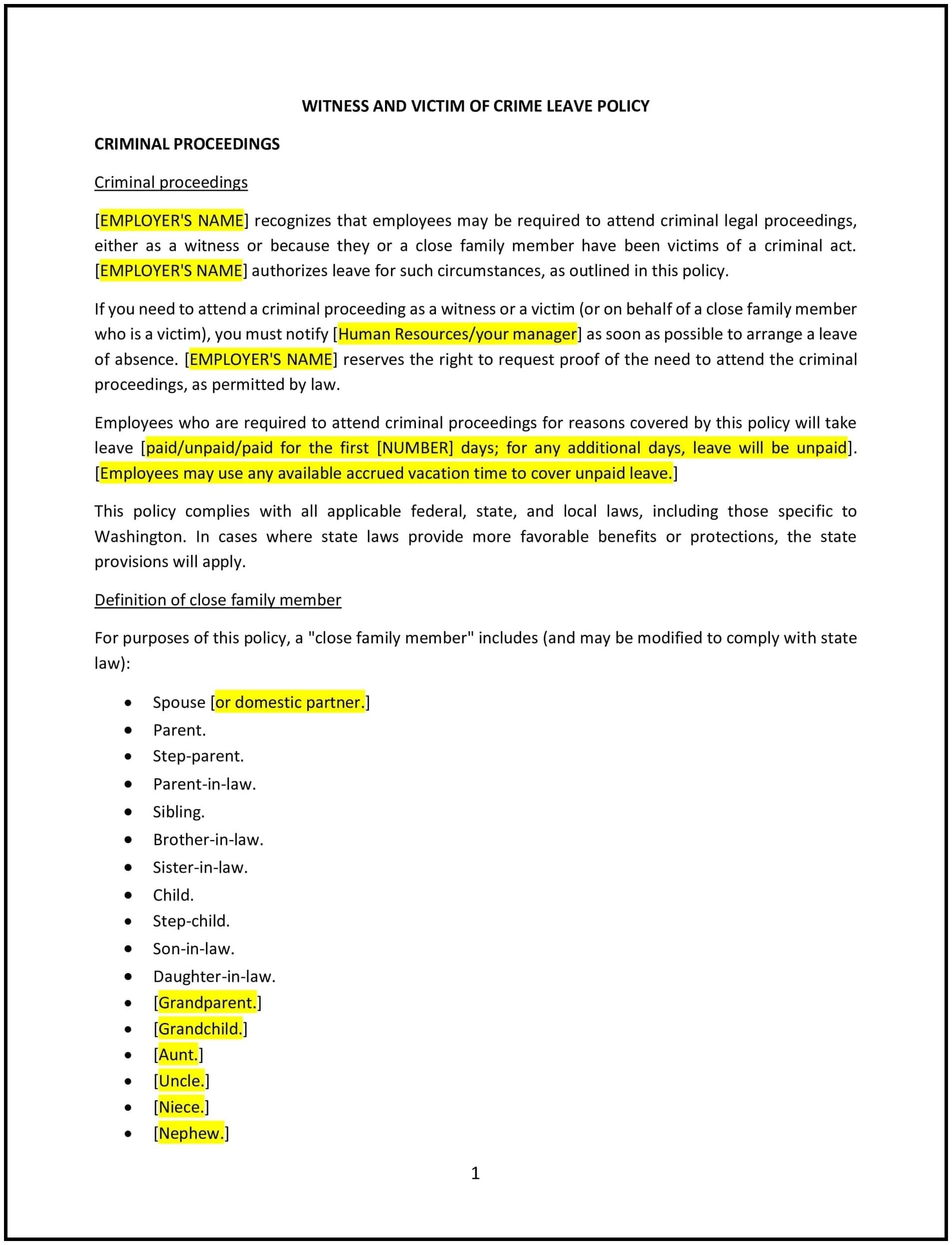Witness and victim of crime leave policy (Washington): Free template
Got contracts to review? While you're here for policies, let Cobrief make contract review effortless—start your free review now.

Customize this template for free
This witness and victim of crime leave policy is designed to help Washington businesses support employees who need time off due to being a victim of a crime or a witness in a criminal case. The policy outlines the company’s commitment to providing leave for employees who must attend court, participate in legal proceedings, or recover from the effects of a crime. It also details the procedure for requesting leave, the documentation required, and the rights employees have under Washington state law.
By adopting this policy, businesses can help employees manage the emotional and legal challenges related to being involved in criminal proceedings, improve employee well-being, and improve compliance with Washington state laws.
How to use this witness and victim of crime leave policy (Washington)
- Define eligibility for leave: The policy should specify which employees are eligible for witness and victim of crime leave, including full-time and part-time employees. It should outline the types of crimes and circumstances under which leave is available, such as being a victim of violent crime or a witness to a crime.
- Outline the process for requesting leave: The policy should clarify how employees should request leave, including the required notice period and the steps to follow. Employees should be instructed to inform their employer as soon as possible when they are required to attend court or participate in legal proceedings.
- Specify the types of leave available: The policy should detail whether leave is paid or unpaid, the maximum amount of leave that can be taken, and any documentation or evidence required to verify the need for leave, such as court subpoenas or police reports.
- Address confidentiality: The policy should ensure that any information related to the employee's status as a victim or witness is treated confidentially. It should specify that sensitive information will not be shared without the employee’s consent unless required by law.
- Provide for recovery time: In addition to attending court or legal proceedings, the policy should provide for leave if the employee needs time off to recover from the effects of being a victim of a crime. This includes time for counseling or medical treatment related to the crime.
- Ensure compliance with Washington state law: The policy should ensure compliance with Washington state laws, including the Crime Victims Compensation Act, which provides leave for employees who are victims of crime, and other relevant legal requirements regarding leave for crime witnesses.
- Review and update regularly: Periodically review and update the policy to ensure it remains compliant with Washington state laws, federal regulations, and any changes in company operations. Regular updates will help ensure the policy stays relevant and effective.
Benefits of using this witness and victim of crime leave policy (Washington)
This policy offers several benefits for Washington businesses:
- Supports employee well-being: By providing leave for victims of crime or witnesses involved in criminal proceedings, businesses can support employees during difficult and emotional times, reducing stress and helping them manage their personal challenges.
- Enhances employee retention: Offering this type of leave can improve employee loyalty and retention, showing that the company is committed to supporting its employees in times of crisis or distress.
- Supports legal compliance: The policy helps businesses comply with Washington state laws regarding employee rights to leave for crime-related matters, reducing the risk of legal penalties or lawsuits.
- Protects employee privacy: The policy ensures that personal and sensitive information related to crime involvement is handled with care and confidentiality, which builds trust between the company and its employees.
- Improves company reputation: A company that offers leave for victims of crime and witnesses demonstrates a commitment to corporate responsibility and employee care, which can improve the company’s public image and attract top talent.
- Reduces workplace disruption: By providing leave, employees can focus on legal proceedings or recovery without worrying about work-related consequences, which ultimately helps maintain a productive and engaged workforce.
Tips for using this witness and victim of crime leave policy (Washington)
- Communicate the policy clearly: Ensure that all employees are aware of the witness and victim of crime leave policy and understand how to request leave. Include the policy in the employee handbook and review it during onboarding.
- Handle leave requests promptly: Respond to leave requests as quickly as possible to ensure that employees have the support they need during their time off. This helps minimize disruption to the employee’s work and ensures business continuity.
- Protect employee confidentiality: Ensure that all information related to an employee’s leave due to being a victim or witness is handled confidentially. Share only the necessary details with relevant parties and protect sensitive information.
- Maintain a supportive environment: Offer support to employees who are victims of crime, including providing resources for counseling or medical care if needed. This helps the employee feel supported and valued during difficult circumstances.
- Review and update regularly: Periodically review the policy to ensure it remains compliant with Washington state laws, federal regulations, and any changes in the company’s operations. Regular updates will help keep the policy relevant and effective.